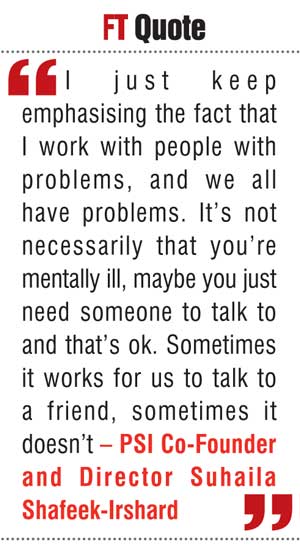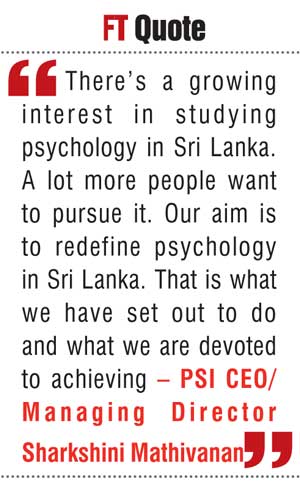Wednesday Feb 18, 2026
Wednesday Feb 18, 2026
Friday, 9 September 2016 00:01 - - {{hitsCtrl.values.hits}}
By Madushka Balasuriya
“If you asked my parents before 22 July where I worked, they would have described the NIMH,” observes Clinical Psychologist Suhaila Shafeek-Irshard wryly. When the acronym stumps me, she clarifies: “Everybody knows it as Angoda.” Ah, yes.
From a young age almost all Sri Lankans are introduced to the idea of ‘Angoda’, as a place where only the mentally unhinged reside, a place where you go and never return. Angoda is of course where the National Institute of Mental Health, formerly known plainly as the Mental Hospital, is located. This demonisation of an institution, which was initially put in place to simply help some of the most vulnerable members of our society, is a sad yet accurate depiction of the ignorance and widely held misconceptions surrounding mental illness in Sri Lanka.
It is in this context that Shafeek-Irshard’s humorous observation about her parents’ lack of awareness regarding her work takes on a darker turn, bringing into focus the magnitude of the task on hand when it comes to reshaping perceptions.
“I just keep emphasising the fact that I work with people with problems, and we all have problems. It’s not necessarily that you’re mentally ill, maybe you just need someone to talk to and that’s ok. Sometimes it works for us to talk to a friend, sometimes it doesn’t.”
To be clear Shafeek-Irshard has not at any point worked at the NIMH, rather she, along with Sharkshini Mathivanan and fellow Clinical Psychologist Dewaka Wanigaratne, are co-founding Directors of the Psychological Sciences Institute (www.psisl.org), Sri Lanka’s first fully integrated provider of psychological training, treatment and research.
Changing perceptions
 The institute, which officially opened its doors on 22 July this year, has already undertaken several community outreach programs, including some among school children.
The institute, which officially opened its doors on 22 July this year, has already undertaken several community outreach programs, including some among school children.
By conducting these awareness programs and workshops, as well as offering London Advanced Level classes in Psychology in-house, PSI hopes to ‘catch’ the next generation young and shift them away from traditional ways of thinking when it comes to mental illness.
“There’s this stigma. Even when they (kids) come up to you they’re very scared and most of the time they relate a story as if it’s happening to somebody else to gauge your reaction. Then afterwards they come up with the real story,” explains Shafeek-Irshard.
“They’re very sort of soft spoken when they first approach, very meek and very reluctant. That’s the usual body language associated with them,” adds PSI CEO and Managing Director Sharkshini Mathivanan.
“That’s where awareness programs start,” continues Shafeek-Irshard. “Which is why we’re heading to schools. We want to catch them really young, when their thought processes are not concrete, when they’re more flexible. They’re more open to new things, unlike our parents’ generation.”
“It’s a lot to do with changing perceptions of how people view psychology in Sri Lanka, from negative to positive,” notes Mathivanan.
This has long been a shared goal among the three founding directors, with two of them – Shafeek-Irshard and Wanigaratne – having previously started a private practice together in 2014, the Behavioural Research Assessment Therapy (BRAT) centre, which worked with schools and corporates to help individuals and children of all ages.
“We used to do things for people we know, and a few private workshops here and there. We never dreamt it would be this big but we thought: ‘Why don’t we take this to the next level?’ We were just playing with ideas when Shark (Mathivanan) came along.
“We did things like psychotherapy, counselling, assessments, and training workshops. We hope to continue doing that, just on a larger scale at PSI. We’re trying to reach out to more people now that we have the facilities to do so.”
Holistic approach
The PSI premises boasts six consultation rooms out of which four have been made available for the use of external counselling psychologists and psychiatrists. The idea is to put clients at ease by offering them a more private and comfortable treatment experience. At present only qualified clinical psychologists can offer consulting services at hospitals in Sri Lanka; counselling psychologists have to make do with renting out office space or hosting clients at home.
But even in a scenario where all psychologists are able to offer their services on hospital premises, the atmosphere that goes with it makes it less likely that someone who needs help will reach out, adds Shafeek-Irshard. Psychological issues such as anxiety and depression are still not seen as problems worth going to a hospital over, she explains, with even the individuals that do eventually seek help not always receiving the all-round treatment they may require. This is something PSI is looking to change in a big way.
“What we’ve lacked so far is a multi-disciplinary approach to dealing with the problem. It’s not just about medicine, it’s not just about supporting the person, but rather supporting the entire family.
“We find with some of the families that come to meet us that one person has been going through something for so long and that has started to affect the entire family. And we didn’t have the facilities until now to go: ‘ok you’re suffering from a problem, and you’re connected to A, B, C and D so they need to be brought in as well’. We didn’t have that facility.”
With only 27 registered clinical psychologists in Sri Lanka – and that number possibly even less in reality as the registration process was introduced many decades ago – PSI’s renting out of consultation rooms also helps bring together a community of professionals that have up until now been working alone.
“We’ve had amazing psychologists in Sri Lanka but they all work in isolation. We have psychiatrists who are doing a good job really, but they’re working in isolation. We have remediation teachers, again working in isolation.
“Our dream is to bring all of them together so that we have this holistic, very eclectic approach to handling problems, so that we can give our clients the best.”
Cutting edge services
It is in this context that PSI feels it will be able to do some of its best work, offering a variety of state-of-the-art tests and assessment tools – that have until now only been available overseas – and using tie-ups with channelling services and psychiatric professionals, to provide clients with an easily accessible route to gaining quality psychological treatment.
 “The first thing most people do right now is make an appointment with a psychiatrist through a channelling service. At present, there are only a handful of psychiatrists who would say ‘Ok I’ll give you some medicine but go and speak to a psychologist as well’,” notes Shafeek-Irshard, drawing attention to the ‘pill-popping’ approach to mental health treatment in Sri Lanka.
“The first thing most people do right now is make an appointment with a psychiatrist through a channelling service. At present, there are only a handful of psychiatrists who would say ‘Ok I’ll give you some medicine but go and speak to a psychologist as well’,” notes Shafeek-Irshard, drawing attention to the ‘pill-popping’ approach to mental health treatment in Sri Lanka.
“If I do think the client needs a little bit more help than I can offer, then I would refer him to a psychiatrist as well. But I’ll say: ‘Get your meds and come back so that I can monitor your medication as well as provide the additional help that you need’. If I think that the problem can be handled without medication then yes we would deal with it here.
“The institute makes this process [of clients finding us] so much easier. Because people know we’re there. And we’re trying to network now. Some psychiatrists we’ve been working with already know we exist, so we’ve always had a flow of clients back and forth. Now it makes life easier for them because there is a place they can just go to.
“Until now, whenever some of my clients have needed certain assessments done they’ve been taken abroad to countries such as Singapore, India and the US. This is because I didn’t have the material I needed to do the tests locally. But it’s very, very expensive when you go abroad and do it. So now we have that here and we can give it at a very affordable price.”
Shaping the next generation
In addition to the consultation services, PSI is also in the business of education. Apart from the previously mentioned Advanced Level Psychology classes on offer, they also provide IELTS and academic writing.
“Academic writing was a recent thing that we thought of actually. Because in my line of work at least, I find that a lot of kids are very smart, they know their subject matter, but when it comes to putting it down on paper they really struggle. There’s no structure in their writing at all, sometimes you have no idea what it is they’re trying to say.”
PSI also plan to cater their academic services to Post-Graduate students by offering qualifications in Counselling and Clinical Psychology at some point in the future. Meanwhile professionals and students alike who may be interested in switching fields or are finding it difficult to settle on a career path can make use of their ‘Career Decision Making System’.
“It’s a standardised online test that you can take, but you need to be supervised by a psychologist. It will place based on your aptitudes, attitudes, likes, dislikes, interests, etc. And it will give you a cluster of prospective occupations that you can look at.”
“Tests can be taken anyone, from kids just after O/levels to someone even in the middle of their careers who wants a change.”
But despite this positive start, the directors at PSI know they have their work cut out for them. In order to offer the best possible treatment, methods of diagnosis need to be tailor-made for Sri Lankans, which can be a time consuming process.
“We’re looking at pursuing research, psychological research in Sri Lanka. We need to start standardising tests; if you take India they are leagues ahead. Standardisation is where you take the test and change it or adapt to our environment. Currently certain questions in the tests don’t really apply to Sri Lankans. Even to change it, there’s a process,” notes Mathivanan.
The process in question involves speaking to a publisher for one, on top of which there is the scientific process which involves conducting several tests and getting other experts in the country to independently verify it.
“Then there is this whole scientific test that we do to see if it’s ok and then you put it in the test,” she adds. “It takes several years actually.”
But despite the long road ahead Mathivanan is not phased, as she is acutely aware of the shift taking place in Sri Lanka when it comes to psychological sciences.
“There’s a growing interest in studying psychology in Sri Lanka. A lot more people want to pursue it. Our aim is to redefine psychology in Sri Lanka. That is what we have set out to do and what we are devoted to achieving.”